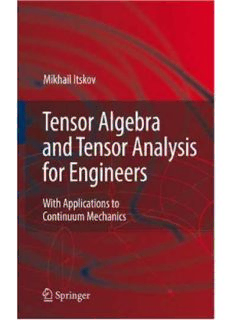
Tensor Algebra and Tensor Analysis for Engineers - With Applns to Continuum Mech - M. Itskov (Springer, 2007) WW PDF
Preview Tensor Algebra and Tensor Analysis for Engineers - With Applns to Continuum Mech - M. Itskov (Springer, 2007) WW
MikhailItskov TensorAlgebraandTensorAnalysisforEngineers Mikhail Itskov Tensor Algebra and Tensor Analysis for Engineers With Applications to Continuum Mechanics With13Figures and3Tables 123 ProfessorDr.-Ing.MikhailItskov RWTHAachen University Department of Continuum Mechanics Eilfschornsteinstr.18 52062Aachen Germany [email protected] Library of Congress Control Number: 2007920572 ISBN 978-3-540-36046-9 SpringerBerlinHeidelbergNewYork Thisworkissubjecttocopyright.Allrightsarereserved,whetherthewholeorpartofthematerial isconcerned,specificallytherightsoftranslation,reprinting,reuseofillustrations,recitation,broad- casting,reproductiononmicrofilmorinanyotherway,andstorageindatabanks.Duplicationof thispublicationorpartsthereofispermittedonlyundertheprovisionsoftheGermanCopyrightLaw ofSeptember9,1965,initscurrentversion,andpermissionforusemustalwaysbeobtainedfrom Springer.ViolationsareliableforprosecutionundertheGermanCopyrightLaw. SpringerisapartofSpringerScience+BusinessMedia springer.com ©Springer-VerlagBerlinHeidelberg2007 Theuseofgeneraldescriptivenames,registerednames,trademarks,etc.inthispublicationdoesnot imply, even in the absence of a specific statement, thatsuch names are exempt from the relevant protectivelawsandregulationsandthereforefreeforgeneraluse. Typesetting:camera-readybytheAuthor Production:LE-TEXJelonek,Schmidt&VöcklerGbR,Leipzig Cover:eStudioCalamar,Spain Printedonacid-freepaper 7/3100YL-543210 Moim roditel(cid:2)m Preface Like many other textbooks the present one is basedon a lecture course given by the author for master students of the RWTH Aachen University. In spite of a somewhat difficult matter those students were able to endure and, as far as I know, are still fine. I wish the same for the reader of the book. Althoughthe presentbookcanbe referredto asatextbookonefinds only little plain text inside. I tried to explain the matter in a brief way, neverthe- lessgoingintodetailwherenecessary.Ialsoavoidedtediousintroductionsand lengthy remarks about the significance of one topic or another. A reader in- terested in tensor algebra and tensor analysis but preferring, however, words instead of equations can close this book immediately after having read the preface. The reader is assumed to be familiar with the basics of matrix algebra and continuum mechanics and is encouragedto solve at least some of numer- ous exercises accompanying every chapter. Having read many other texts on mathematicsandmechanicsIwasalwaysupsetvainlylookingforsolutionsto the exercises which seemed to be most interesting for me. For this reason,all the exerciseshere aresuppliedwith solutionsamountinga substantialpartof the book. Without doubt, this part facilitates a deeper understanding of the subject. As a research work this book is open for discussion which will certainly contribute to improving the text for further editions. In this sense, I am very gratefulforcomments,suggestionsandconstructivecriticismfromthereader. Ialreadyexpectsuchcriticismforexamplewithrespecttothelistofreferences which might be far from being complete. Indeed, throughout the book I only quotethesourcesindispensabletofollowtheexpositionandnotation.Forthis reason, I apologize to colleagues whose valuable contributions to the matter are not cited. Finally, a word of acknowledgment is appropriate. I would like to thank Uwe Navrath for having prepared most of the figures for the book. Fur- ther, I am grateful to Alexander Ehret who taught me first steps as well assome“dirty”tricksinLATEX, whichwereabsolutelynecessarytobringthe VIII Preface manuscript to a printable form. He and Tran Dinh Tuyen are also acknowl- edged for careful proof reading and critical comments to an earlier version of the book. My special thanks go to the Springer-Verlag and in particular to Eva Hestermann-Beyerle and Monika Lempe for their friendly support in getting this book published. Aachen, November 2006 Mikhail Itskov Contents 1 Vectors and Tensors in a Finite-Dimensional Space ........ 1 1.1 Notion of the Vector Space ............................... 1 1.2 Basis and Dimension of the Vector Space ................... 3 1.3 Components of a Vector, Summation Convention ............ 5 1.4 Scalar Product, Euclidean Space, Orthonormal Basis......... 6 1.5 Dual Bases ............................................. 8 1.6 Second-Order Tensor as a Linear Mapping.................. 12 1.7 Tensor Product, Representation of a Tensor with Respect to a Basis................................................. 16 1.8 Change of the Basis, Transformation Rules ................. 18 1.9 Special Operations with Second-Order Tensors .............. 19 1.10 Scalar Product of Second-Order Tensors.................... 25 1.11 Decompositions of Second-Order Tensors ................... 27 1.12 Tensors of Higher Orders ................................. 28 Exercises ................................................... 28 2 Vector and Tensor Analysis in Euclidean Space ............ 33 2.1 Vector- and Tensor-Valued Functions, Differential Calculus ... 33 2.2 Coordinates in Euclidean Space, Tangent Vectors............ 35 2.3 Coordinate Transformation. Co-, Contra- and Mixed Variant Components ............................................ 38 2.4 Gradient, Covariant and ContravariantDerivatives .......... 40 2.5 Christoffel Symbols,Representationof the CovariantDerivative 44 2.6 Applications in Three-Dimensional Space: Divergence and Curl 47 Exercises ................................................... 55 3 Curves and Surfaces in Three-Dimensional Euclidean Space 57 3.1 Curves in Three-Dimensional Euclidean Space............... 57 3.2 Surfaces in Three-Dimensional Euclidean Space ............. 64 3.3 Application to Shell Theory............................... 71 Exercises ................................................... 77 X Contents 4 Eigenvalue Problem and Spectral Decomposition of Second-Order Tensors ..................................... 79 4.1 Complexification ........................................ 79 4.2 Eigenvalue Problem, Eigenvalues and Eigenvectors........... 80 4.3 Characteristic Polynomial ................................ 83 4.4 Spectral Decomposition and Eigenprojections ............... 85 4.5 Spectral Decomposition of Symmetric Second-Order Tensors .. 90 4.6 Spectral Decomposition of Orthogonal and Skew-Symmetric Second-Order Tensors................. 92 4.7 Cayley-Hamilton Theorem................................ 96 Exercises ................................................... 97 5 Fourth-Order Tensors...................................... 99 5.1 Fourth-Order Tensors as a Linear Mapping ................. 99 5.2 Tensor Products, Representation of Fourth-Order Tensors with Respect to a Basis ..................................100 5.3 Special Operations with Fourth-Order Tensors ..............102 5.4 Super-Symmetric Fourth-Order Tensors ....................105 5.5 Special Fourth-Order Tensors .............................107 Exercises ...................................................109 6 Analysis of Tensor Functions ..............................111 6.1 Scalar-Valued Isotropic Tensor Functions ...................111 6.2 Scalar-Valued Anisotropic Tensor Functions.................115 6.3 Derivatives of Scalar-Valued Tensor Functions...............118 6.4 Tensor-Valued Isotropic and Anisotropic Tensor Functions ....124 6.5 Derivatives of Tensor-Valued Tensor Functions ..............131 6.6 Generalized Rivlin’s Identities.............................135 Exercises ...................................................137 7 Analytic Tensor Functions .................................141 7.1 Introduction ............................................141 7.2 Closed-Form Representation for Analytic Tensor Functions and Their Derivatives ....................................145 7.3 Special Case: Diagonalizable Tensor Functions ..............148 7.4 Special case: Three-Dimensional Space .....................150 7.5 Recurrent Calculation of Tensor Power Series and Their Derivatives .............................................157 Exercises ...................................................159 8 Applications to Continuum Mechanics .....................161 8.1 Polar Decomposition of the Deformation Gradient ...........161 8.2 Basis-Free Representations for the Stretch and Rotation Tensor162 8.3 The Derivative of the Stretch and Rotation Tensor with Respect to the Deformation Gradient..................165 Contents XI 8.4 Time Rate of Generalized Strains..........................169 8.5 Stress Conjugate to a Generalized Strain ...................171 8.6 Finite Plasticity Based on the Additive Decomposition of Generalized Strains ......................173 Exercises ...................................................178 Solutions ......................................................179 References.....................................................231 Index..........................................................235
Description: